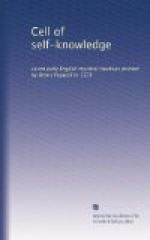[112] So Pepwell. Harl. Ms. 674 reads: “each desire on desire.” Harl. Ms. 1022, ed. Horstman, has: “hekand desire unto desire.”
[113] Gen. xxxv. 18.
[114] Ps. xxvi. (Vulgate xxv.) 12.
[115] So Harl. MSS. 1022 and 2373; Pepwell and harl. Ms. 674 read: “godly.”
[116] Ps. lxviii. 27 (Vulgate lxvii. 28).
[117] So Harl. Ms. 2373; omitted in Harl. Ms. 674. Pepwell has instead: “To the which us bring our blessed Benjamin, Christ Jesu, Amen.” Harl. Ms. 1022 ends: “Jesus Jesu, Mercy, Jesu, grant Mercy, Jesu.” The whole of this concluding paragraph, which is an addition of the translator, differs considerably in Pepwell.
[118]So Pepwell and Ms. Reg. 17 D.V.; Caxton has: “Thou art she that art not, and I am he that am”; which is nearer to the Latin.
[119]Caxton reads: “I escape gracyously all his snares.”
[120]Cf. Dante, Par. xxxiii. 100-105:—
" A quella luce cotal si diventa,
Che volgersi da lei per altro aspetto,
E impossibil che mai si consenta;
Pero che il ben, ch’e del volere obbietto,
Tutto s’accoglie in lei, e fuor di quella
E difettivo cio che li e perfetto.”
" Such at that light does one become, that it were impossible ever to consent to turn from it for sight of ought else, For the good, that is the object of the will, is wholly gathered therein, and outside it that is defective which there is perfect.”
[121]So Pepwell: Caxton has: “yf thou wilt gete the vertu of ghostely strength.”
[122]Pepwell and the Ms. add: “and temptations” (Caxton: “of temptacyons"); which is clearly out of place. Cf. Legenda, SS 104 (Acta Sanctorum, Aprilis, tom. iii.).
[123]2 Cor. i. 7.
[124]Mated. Caxton has: “vertuously y-mette.” Cf. Legenda, SS 101: “Talis anima sic Deo conjuncta.”
[125]2 Cor. xii. 10.
[126] “And the cause and the rote” (Caxton).
[127]Sometimes.
[128]Caxton has: “It happed she sayde that other whyle deuoute feruour of a sowle leuyng oure lorde Jhesu other by somme certeyne synne, or ellys by newe sotyll temptacyons of the fende wexyth dull and slowe, and other whyle it is y-brought to veray coldenesse.” Pepwell and the Ms. are entirely corrupt: “It happeneth (she sayth) that otherwhyle a synner whiche is leuynge our Lord Jhesu by some certeyn synne, or ellys by some certeyn temptacyons of the fende,” &c. The original of the passage runs thus: “Frequenter enim (ut inquiebat) contingit animae Deum amanti quod fervor mentalis, vel ex divina providentia, vel ex aliquali culpa, vel ex haustis adinventionibus inimici, tepescit, et quandoque quasi ad frigiditatem usque deducitur” (Legenda SS 107).
[129]So Caxton; Pepwell has: “leaving.”
[130]Caxton has: “seeth”; the Latin text: quantumcumque videat seu sentiat.




